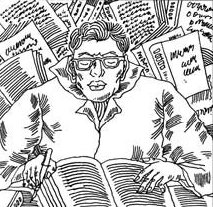Translation used to be a serious academic endeavor but now it has become a heavily market-oriented industry, and one in great disorder.
Since China began to open itself to the outside world about 30 years ago, exchanges with foreign countries have been increasing dramatically. That posed a rising demand for translation of Chinese and foreign languages.
Companies specializing in translation cropped up in major cities. There are now about 3,000 translation companies registered with the industrial and commercial authorities. In addition, there are numerous unregistered organizations and individuals engaged in the business. It is reported that the business has developed into an industry with an annual output value of more than 20 billion yuan ($2.78 billion).
The industry, however, is running unbridled. A large number of small companies compete for clients offering low charges. To reduce their production costs, these companies employ sub-standard translators with low remuneration. The result is translations that leave a lot to be desired.
Translation services focus on three main categories. First, translated books published by regular publishing houses; second, technical documents imported from abroad and introduction of products or services Chinese firms offer to foreign clients; and third, publicity materials local governments print to promote international communications. Poor translations can be found in all three categories, especially in the latter two.
Generally, regularly published books are better in quality but they are inferior to those published before the 1980s. Since the early 1990s, Chinese publishers began to publish Chinese versions of foreign books in large numbers. In order to beat rivals, they quickened the process of translation by either forcing the translator to finish the work quickly or appointing several translators to do one book. A book of regular length was often published in just a few months after the original foreign version was launched. One can easily envision what the translation was like.

Things are even worse with the other two categories. The root cause lies in the unusual nature of translation as a service product. Unlike a computer or a home appliance, the quality of a translated text is not ostensibly for the consumer. For instance, a manufacturing plant wants to have the introductory pamphlet of one of its products translated into English. It goes to a translation company, naturally one that offers the lowest price. The company hires a group of college students to do the job, on very low wages. But the company usually does not check (and it has no ability to check) the translation, which is ridden with grammatical mistakes.
Translation has not been recognized by society as a painstaking work and people generally do not know the difference between a faithfully and meticulously translated work and a shoddy piece. There seems to be no hope the situation is going to change soon. But the competent authorities can do something to regulate the market.
At a forum of the country's top translators organized by the China Translation and Publishing Corporation (CTPC) last week, this writer learned that the National Standardization Administrative Commission has published national standards for translation and a revised version is being considered. The problem now is who will supervise the execution of the standards. The National Industrial and Commercial Administration seems to be the one, since it authorizes publishing and translation companies.
E-mail: liushinan@chinadaily.com.cn
(China Daily 04/09/2008 page8)